

'Religious Extremism' and the use of Force
Since 2001, because of CDSM’s depth of understanding of Values, we have been involved in a variety of projects aimed at understanding ‘extreme’ behaviours – ranging from money laundering to suicide terrorism. Some of our latest research has established a clear Values ‘danger zone’, where the individual’s Values can facilitate, rather than mitigate, a propensity for ‘intemperate behaviour’.
|
We use the rather mild adjective ‘intemperate’ because, apart from truly life-threatening behaviours, this Values area – the ‘Intemperate Zone’ (IZ) – can also facilitate such things as endemic abusive management in business. For many years, as our thoughts about this were evolving, we identified – from media reports, video evidence, biographies, autobiographies and surveys – a distinctive set of behaviours that cause harm to institutions, organisations and individuals. For the most part, these situations of harm appear uncorrelated. Examples of these behaviours include LIBOR-fixing, martyrdom actions, abusive management cultures, extreme political affiliation, sexual harassment in the workplace, racism in public organisations, and so on. The behaviours and situations are different. Experts and specialists in these fields judge the behaviours as aberrant, deviant or an ‘outlier’ in terms of acceptable practice – and then merrily set about ascribing blame and ‘fixing’ the situation, only for another form of harmful behaviour to emerge some time later. It seems that harmful behaviour is endemic. |
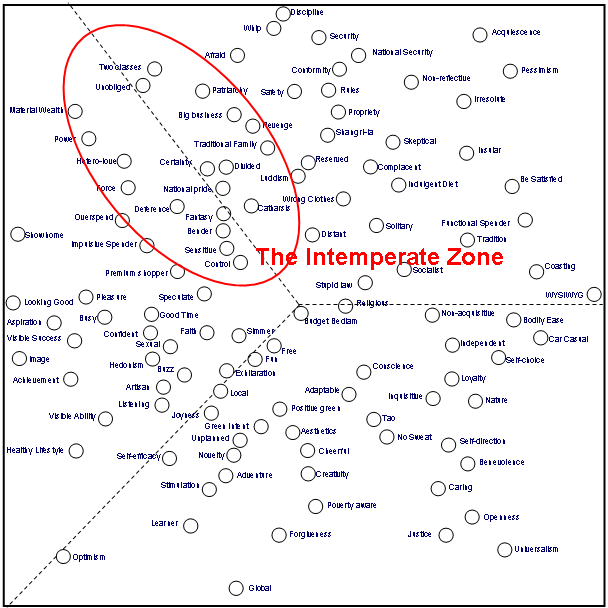 |
In contrast to that way of thinking, our research indicates that such behaviours are actually normal and rational for those who perpetrate them. In other words, these behaviours are not the result of ‘chaotic’ mental processes. The trigger for this ‘rationality’ is an identifiable and measurable part of the individual’s Values set in transition. This is what we see in the IZ, where the individual’s self-identity is moving from one based on morality – rules and standards based on belonging to a group – to one based on being perceived as ‘better than others’. This is the transition from the Settler to the Prospector Maslow Groups – and, in particular, the Brave New World to Golden Dreamers Values ModesTM.
Using recent surveys in a number of countries around the world, we have been able to study the attributes of the IZ in combination with ‘religiosity’. In particular, we have looked at the combination of being both ‘highly religious’ and accepting of the everyday use of physical force to ‘get what you want’.
In what follows, we have chosen four countries with very different geography, language and dominant religion. In each case, we have found only a small percentage that espouses the combined ‘religious-force’ factor within the culture. These small numbers are suggestive that these individuals will likely be regarded as outliers and aberrant by the standards of the culture in which they are embedded.
In contrast, each of the separate elements – religious and force – is espoused by much larger numbers throughout each population. However, because these two elements do not act in conjunction for the majority, they are less salient as motivators of harmful behaviours – they do not trigger intemperate behaviours – for now. Once this idea is taken on board and digested, it becomes clear that the ‘religious-force’ position is, historically and in the present day, a well observed ‘atavistic option’ to be deployed in times of high stress and crisis.
|
|
|
The data also shows that the particular form of religion – Islam, Protestant, Catholic, etc. – is far less of a motivator to harmful behaviour than are the Values of a few ‘normal’ people, whose Values are in transition and who perform harmful behaviour when they act intemperately.
We also observe that people with this (IZ) Values orientation respond very positively to propositions which the vast majority find unacceptable. This indicates that, to the IZs, it is acceptable to act in ways that others don’t. ‘Intemperate’ to them is a good thing – not pejorative.
So, let’s take a peek at the data. Keep in mind we are looking at the outliers of something that is entirely natural and not aberrant.
When measuring just ‘religious’ we find the espousers cluster towards the middle of the map. When measuring ‘force’ we see the espousers clustering towards the top left hand corner of the map. The maps that follow show the positioning on the Terrain Map of those who are both very religious and accepting of the use of physical force as a means to an end.
It is easy to see that, when both factors are taken together the “Force area” lights up and the Religion area is vacated – hence the working hypothesis, Force trumps Religion.
Note that there is, surprisingly, nothing for the UK. This reflects the fact that this is a developing body of knowledge. We simply have not asked the same questions in the UK (largely because the UK is such a secular society). This is a gap that will be filled in the latter half of 2013.
The United States of AmericaThis is a Christian culture with a mature economy. Religious-Force espousers amount to just under 2% of the population. Of these, 70% are Prospectors – specifically, 50% are within the Golden Dreamers, and 9% in Brave New World. They are predominantly male (68%) and young (56% aged 21-34). 18% of the population regard themselves as 'very religious', and 6% of the population are very accepting of 'Force'. The median age of the US population is 38.5 years. |
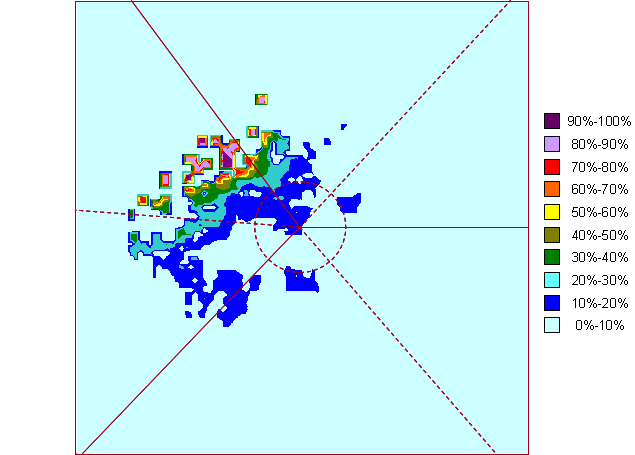 |
BrazilThis is Christian Catholic culture with an emergent economy. Religious-Force espousers amount to 2% of the population. Of these, 62% are Prospectors – specifically, 38% in Golden Dreamers and 17% in Brave New World. They are predominantly male (59%) and young (62% aged 16-34, with 26% aged 16-20). 21% of the population regard themselves as 'very religious', and 8% of the population are very accepting of 'Force'. The median age of the Brazilian population is 31.1 years. |
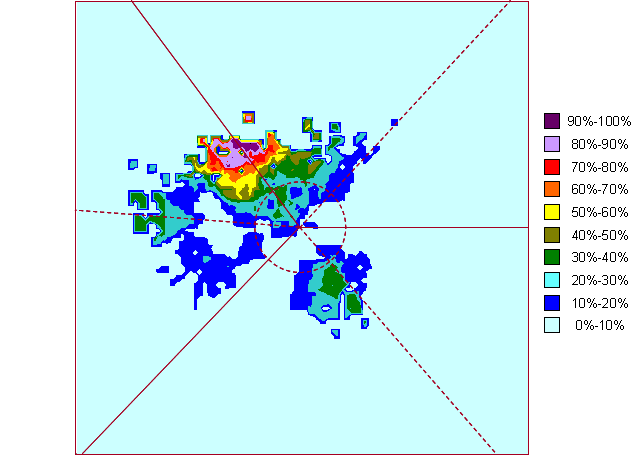 |
The PhilippinesThis is a Christian Catholic culture. It has a ‘third world’ economy. Religious-Force espousers amount to just over 3% of the population. Of these, 79% are Prospectors – specifically, 49% in Golden Dreamers and 15% in Brave New World. They are predominantly male (65%) and young (50% aged 21-34). 25% of the population regard themselves as 'very religious', and 11% of the population are very accepting of 'Force'. The median age of the population of The Philippines is 23.3 years. |
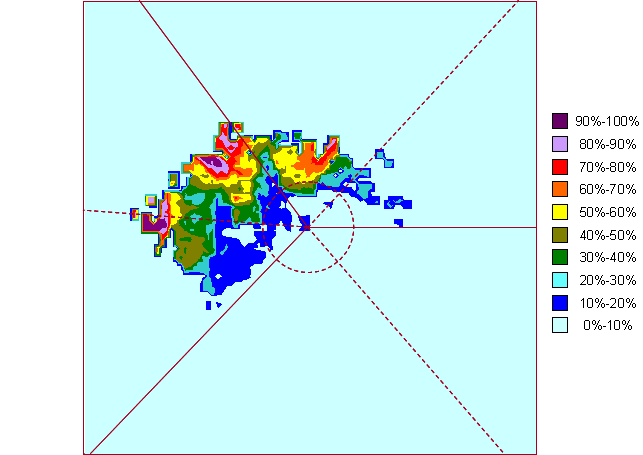 |
IndonesiaThis is the largest Muslim culture in the world. It has a ‘third world’ economy. Religious-Force espousers amount to between 4% and 5% of the population. Of these, 72% are Prospectors – specifically, 32% in Golden Dreamers and 8% in Brave New World. They are predominantly male (52%) and young (65% aged 21-44). 30% of the population regard themselves as 'very religious', and 15% of the population are very accepting of 'Force'. The median age of the Indonesian population is 29.5 years. |
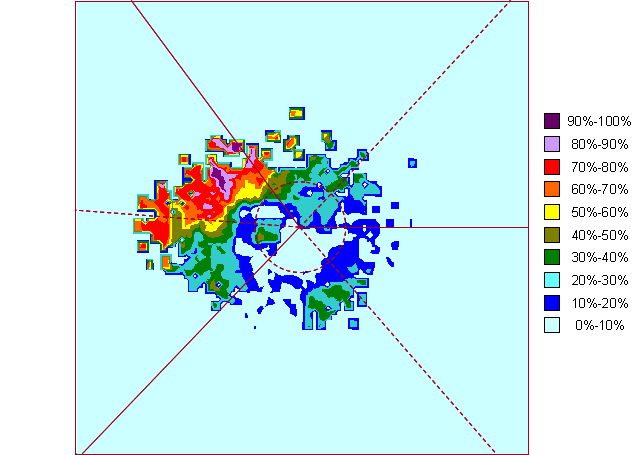 |
Conclusion
The movement from Settler to Prospector is a normal life transition for the human species. It presents problems for cultures that value stability based on relatively rigid morality. It results in attitudes and behaviours that defy tradition and conformance to societal norms.
Because of the nature of the transition, it is more likely to occur in young to early middle age. In males, it can trigger a complex set of needs and subconscious motivations that can lead to harmful behaviours. These behaviours are fully congruent with their Values and so are judged, by the individual, to be more or less ‘rational’. Others, however, often judge those attitudes and behaviours as aberrant.
 |
|
 |
The ‘intemperate zone’ – the IZ – is most correlated with the Prospector Maslow Group – particularly with the Golden Dreamers. The underlying ‘normal’ need in the IZ is the desire for ‘Power’ (over others, over things and over ideas) – to be regarded as “better than others”.